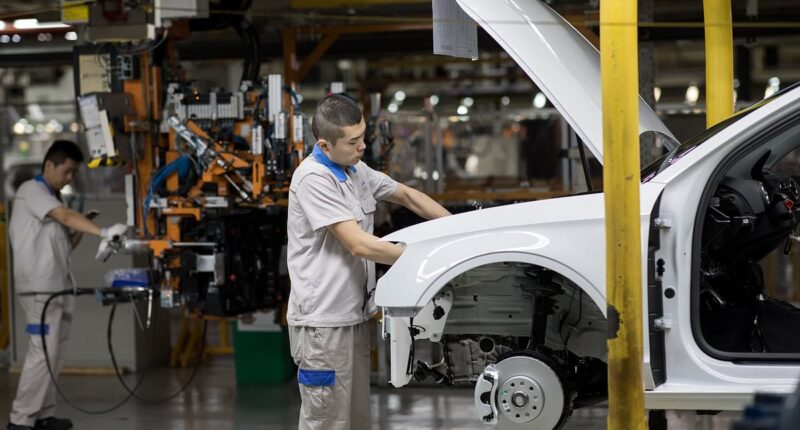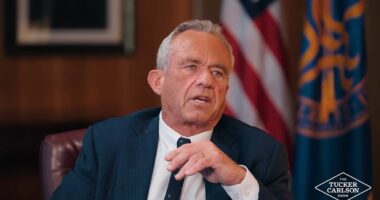As President Donald Trump had hoped, carmakers are starting to shift gears on manufacturing.
However, much of the focus from the industry is on electric cars. This is a technology that President Trump has criticized several times, despite his trade policies playing a part in bringing this technology to the United States.
In 2024, Volkswagen Group, the second-largest car manufacturer in the world, is getting ready to join a long list of car companies that are revamping their American factories in response to the tariffs.
The luxury division of the German carmaker, Audi, is known for producing most of its vehicles in various locations such as Germany, Hungary, Mexico, Slovakia, Spain, and China. However, Audi is now making plans to manufacture some of its crossover and SUV models in the United States.
‘We want to localize more strongly in the USA,’ a company spokesperson told DailyMail.com.
‘To this end, we are currently examining various scenarios. We are confident that we will make a decision on this in consultation with the Volkswagen Group before the end of this year as to what this will look like in concrete terms.’
On a recent earnings call, Audi CFO Jürgen Rittersberger added that Audi plans to launch 10 new models in the US, with production locations to be announced in 2026.
While no final decision has been made, sources speaking to German trade publication Automobilwoche say Audi is scouting three potential locations in the US.

Audi is reportedly looking at bringing manufacturing capacity to the US
The frontrunner plant reportedly in consideration is in Chattanooga, Tennessee, where its parent company Volkswagen already builds the ID.4 electric crossover.
Since the Audi Q4 E-tron shares a similar platform with the ID.4, the plant could be adapted relatively quickly to handle production without starting from scratch.
Volkswagen also builds the Atlas and Atlas Sport at the Chattanooga facility, and several thousand vehicles from the plant are exported each year — boosting US GDP in the process.
Shifting production lines to make room for Audi models could slow some of those exports, but it would deepen the domestic supply chain.
Another potential site is in South Carolina, where VW is breaking ground on a new factory to build electric-based pickups and SUVs under the Scout Motors name.
The third option remains undisclosed. An Audi spokesperson didn’t immediately respond to DailyMail.com’s request for comment.
President Trump has claimed that his 25 percent tariffs will revive American manufacturing after decades of decline.
Some automakers are now localizing production of EV platforms they’ve already poured billions into — creating a reshuffling of global supply chains that aligns with White House goals, even if not with its messaging.

The Q4 E-tron, an electric crossover, is reportedly one of the cars in consideration to move to US plants

Audi’s CFO, Jürgen Rittersberger, said the company hopes to launch ten new cars in the US in the next year

Audi currently builds most of its cars in Europe, China, and Mexico
Audi is a great example: the company has been launching multiple electric concept vehicles and has bet heavily on customers going EV.
Hyundai, too, has doubled down on building its Ioniq electric series in Georgia during the second Trump administration.
Honda said plans to keep Civic Hybrid production in Indiana in response to the tariffs.
Even startups are getting the message.
Jeremy Snyder, chief commercial officer of the newly-unveiled Slate electric truck company, told DailyMail.com that US EV manufacturing is a no-brainer.
‘Building EVs for a new company is the only obvious solution,’ Jeremy Snyder, the CCO of Slate told Daily Mail.com.
‘Current EV problems are a education and infrastructure issues that are being corrected over time.
‘For drivers, it is simply a better experience. You pull into your parking spot, you plug in, you wake up to a full “tank” every single day.’

















